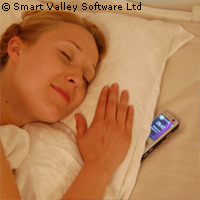Mobile phone technology makes waking up easier
Researchers in Finland have developed a new technology for mobile phones that screens for and diagnoses sleep disorders. The 'smart alarm clock' is used to gently awaken users and is commercially available. Sleep disorders (somnipathies) are widely experienced in one form or another, and some of these can interfere with a person's normal physical, mental or emotional functioning. Common sleep disorders include insomnia, bruxism (grinding or clenching teeth during sleep), circadian rhythm disorders, shallow or slow breathing during sleep, night terror, periodic limb movement disorder (e.g. involuntary kicking or restless legs), sleep walking and jet lag. These conditions can be brought about by any number of things, including changes in lifestyle (e.g. work shift change), anxiety, pain, noise, incontinence, certain medications, hormone disorders, premenstrual tension or alcoholism. Diagnosing sleep disorders requires extensive testing, usually in a sleep clinic using a series of tests, and the maintenance of a 'sleep diary'. The process can be time-consuming and costly. Sleep disorders can be serious: recent research has shown that sleeping less than five hours a night increases the risk for high blood pressure. However, because of the inconvenience and expense of conventional diagnosis, most people with sleep disorders simply try to live with the problem. One way to reduce the stress caused by a sleep disorder is to wake up gently. Studies have shown that the best time for an alarm clock to go off is when a person is 'almost awake' in terms of their natural sleep rhythm. At that point the body and brain are ready to wake up, so the change from sleep to wakefulness is least jarring. The researchers focused on this part of the sleep cycle, and developed what they call 'an arousal clock' rather than an alarm clock. Researchers from Tampere University of Technology and the University of Helsinki, both in Finland, used a simple microphone that is available in most mobile phones to record and analyse movement in 80 subjects over a 6 month period. They found that the technology was adequate to analyse periods of calm and movement in a regular bedroom setting. Dr Tapani Salmi of Tampere University of Technology explained, 'Very soon we noticed that a common microphone is very sensitive to any sounds and voices produced by movements in the bed during night-time. Everyone has heard the typical voices, when a mobile phone has accidentally called you from someone's pocket.' The new alarm clock is built in to a mobile phone. The subject sets the desired alarm time as normal and places the phone nearby (usually beneath the pillow). The phone analyses the subject's 'sleep movement sounds'. Twenty minutes before the alarm is set to go off, the phone determines when the subject is making 'almost awake' sounds, and gives off a soft alarm signal. The 'arousal clock' is less stressful than a conventional alarm clock, and sleep-diary analysis indicated that subjects benefited after using the new device for a week. Dr Salmi reported that using the clock continuously 'helps the internal clock in your brain learn the proper sleep rhythms'. No alarm signal is given before the set alarm time if the subject is sleeping calmly, as subjects who experience very deep sleep at alarm time do not appreciate any alarm, no matter how gentle. Movement analysis is commonly used in combination with other sleep diagnostics to screen for somnipathies; the Finnish study's innovation was in using a wireless technology. Because the device is not physically attached to the patient, the act of analysing movement did not interfere with the subjects during sleep. The new technology is capable of performing several all-night recordings, so it can be used to analyse a subject's sleep patterns over the course of a few days. Importantly, it can be used to diagnose sleep disorders in regions that do not have sleep clinics. It is convenient and cost efficient compared to the conventional battery of tests used in sleep clinics. Dr Salmi and colleagues hope that their technology can be applied to monitoring other aspects of sleep, including snoring, sleep apnoea and restless legs syndrome. The researchers caution that their product, called HappyWakeUp, is not a medical product, and is not a treatment that targets a specific disease. They stress the importance of consulting a doctor about sleep-associated diseases and symptoms.
Countries
Finland



